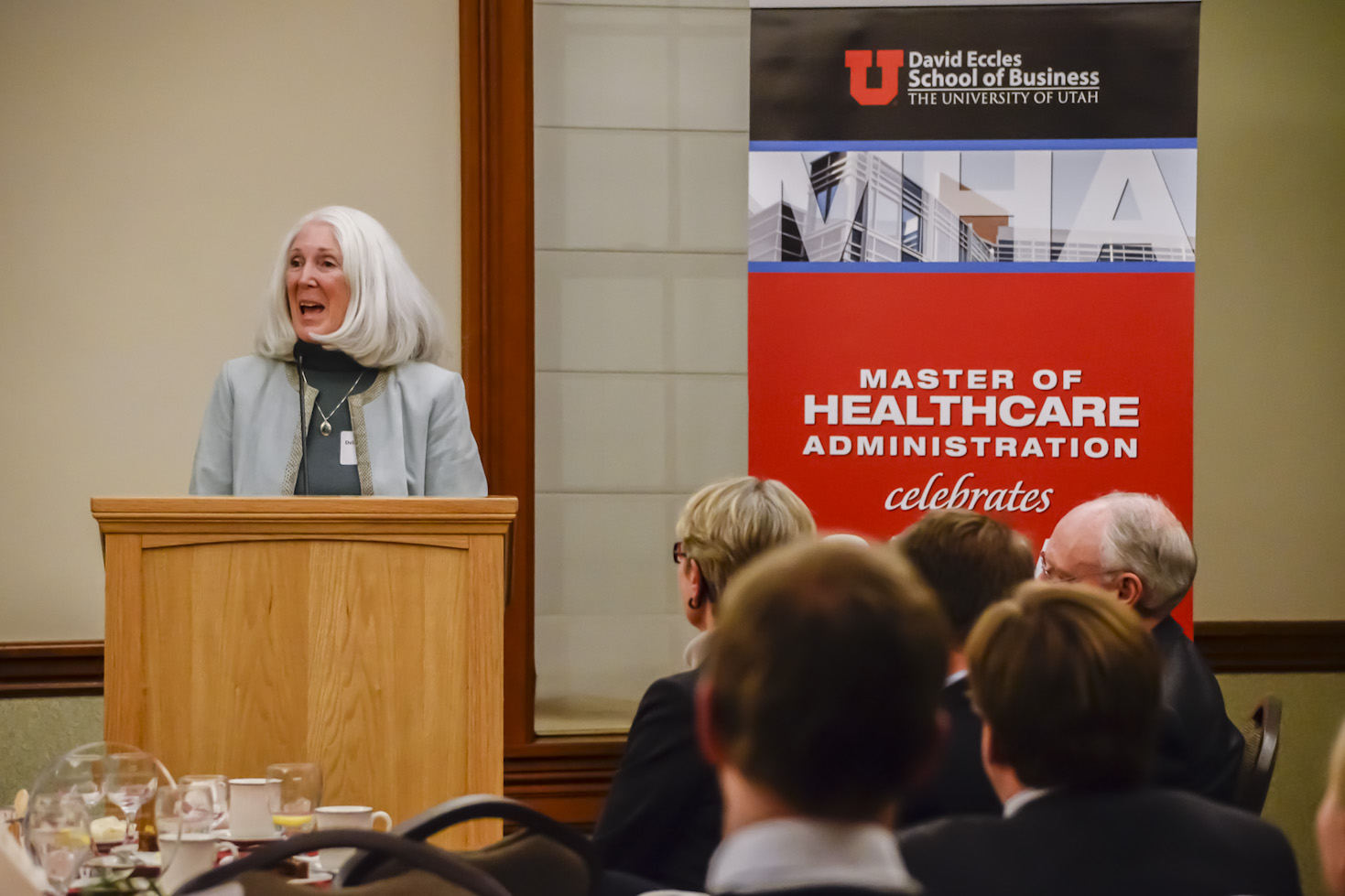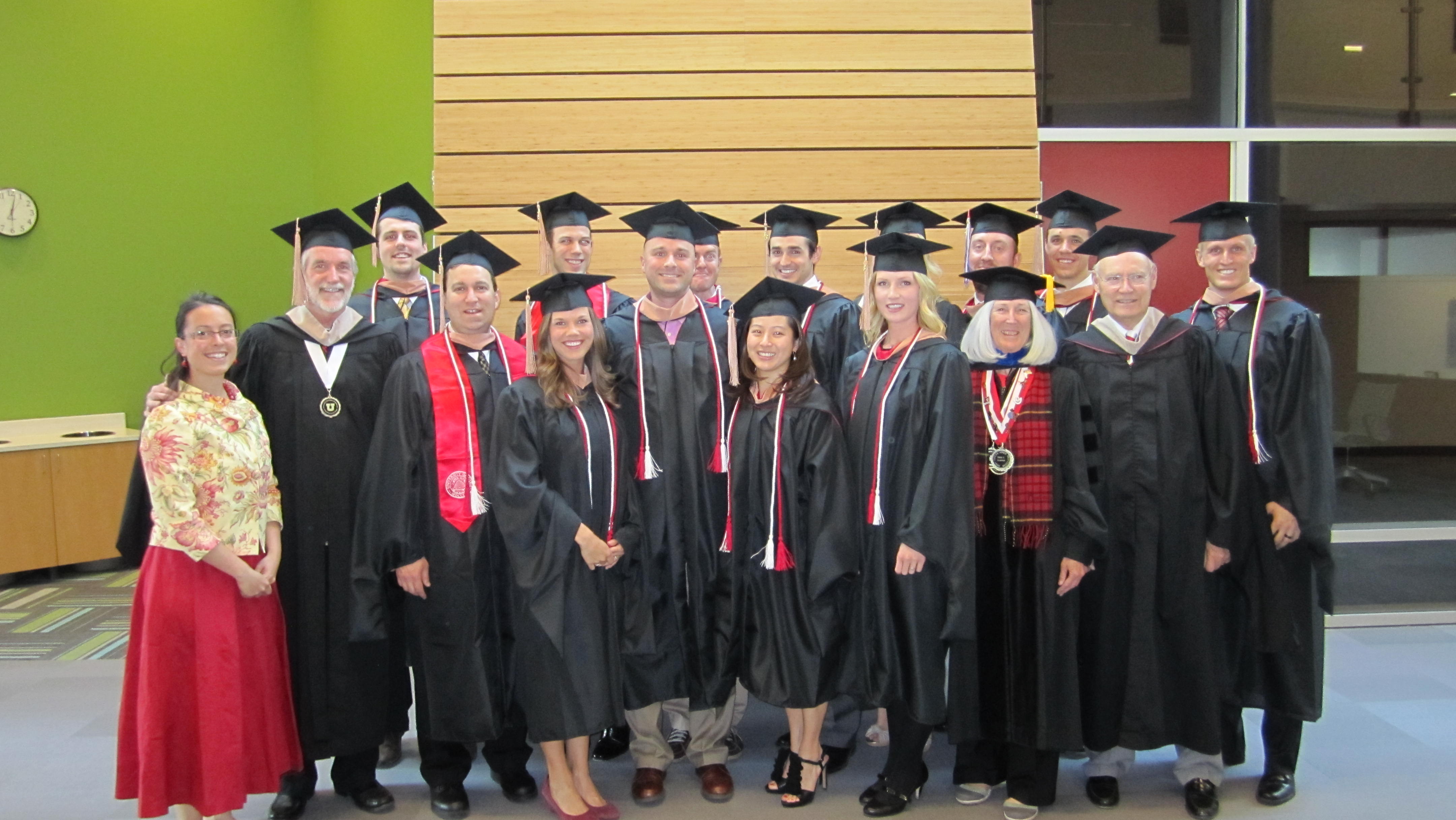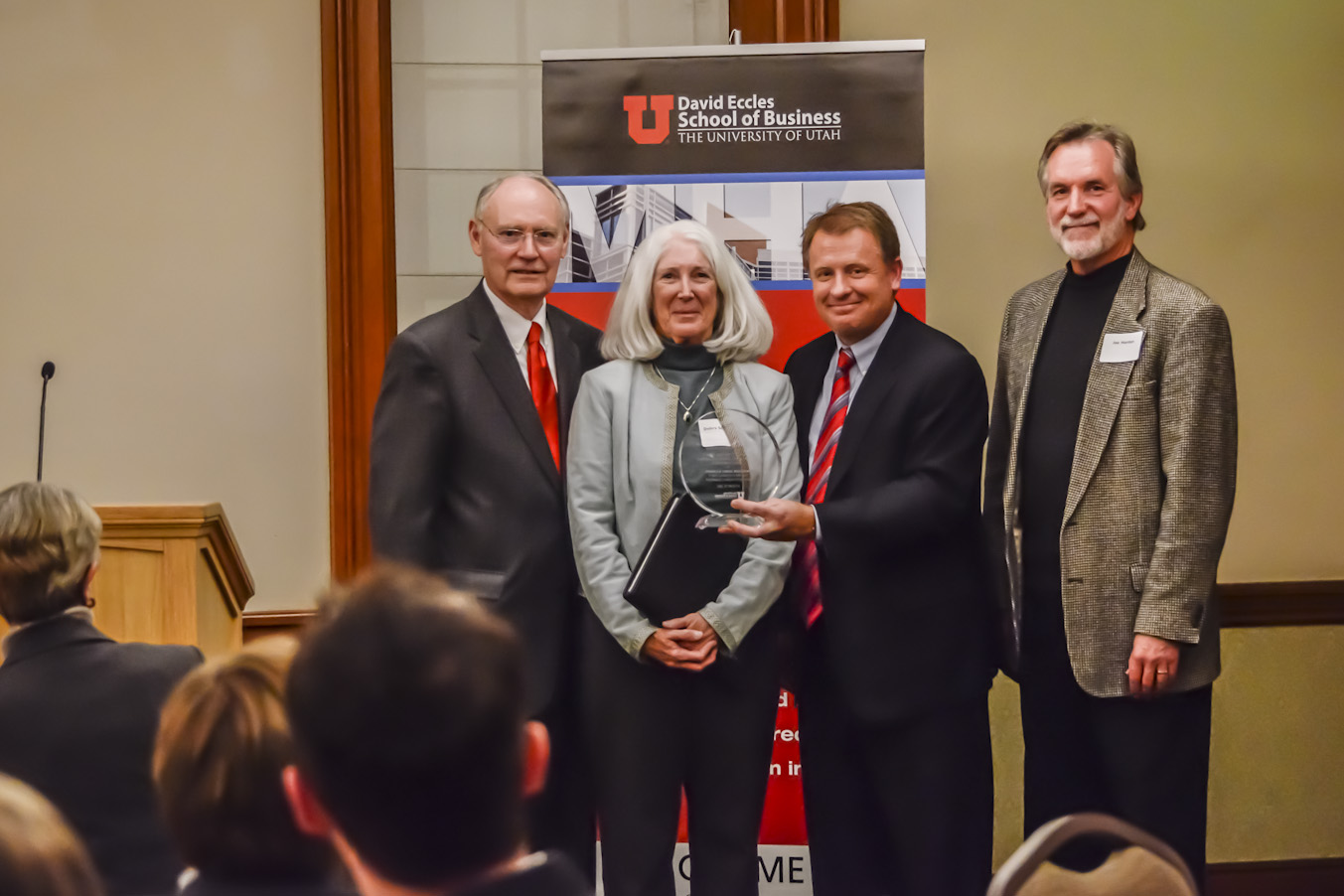AUPHA: What’s your educational background? Why did you choose the area(s) of study that you did and what did you do before getting into academe?
Scammon: I have a BS in Marketing from California State University, Northridge, and an MS and a PhD in Marketing from UCLA. As an undergraduate I worked as a research assistant in a TB hospital where my mother was a microbiologist studying the impact of Vitamin C on tuberculosis sensitivity. I assisted with data analysis for clinical research projects and prepared research presentations and manuscripts for the physicians and researchers. In my MS program I became interested in public policy, particularly policy that impacted consumers’ access to information in the marketplace. In my PhD program, I delved deeper into public policy with a minor in Law and Economics and a major focus on consumer decision-making. My dissertation dealt with the effective communication of nutrition information and evaluated the Federal Trade Commission’s proposals for the regulation of nutrient disclosures in food advertising. My research focuses on finding innovative solutions to real problems that increase consumer welfare. I always had a particular interest in healthcare related issues, so health policy and patient advocacy were natural extensions of my concern for consumer welfare. Patients’ access to information about health healthcare alternatives that facilitates active decision-making underlies my interest in primary care redesign towards a patient centered medical home model.
My first position after graduate school was as an assistant professor of marketing in the School of Business at the University of Utah. I’ve spent my entire professional career at the University of Utah with a leave of absence to visit the Federal Trade Commission as a marketing and advertising consultant. In that role, I worked on the Food Advertising and the Children’s Advertising trade regulation rules. At the University of Utah, I spent three years as chair of the marketing department, and 15 years in the Associate Dean’s office filling roles in Research and Faculty Development and managing Academic Programs. In 2008, I was appointed as an adjunct faculty member in the School of Medicine, Department of Family and Preventive Medicine.
AUPHA: What is your current position and what made you choose the program you are currently appointed to?
 Scammon: I am the Emma Eccles Jones Professor in the Department of Marketing and Director of the MHA program in the David Eccles School of Business. Throughout my career at the University of Utah, I have been involved in programs related to healthcare. Prior to approval of our MHA degree, the University offered a graduate certificate in Health Services Administration. I taught in that program and was on the faculty advisory board for the program for 25+ years. After resigning from my position as Associate Dean of Academic Programs, I took a one-semester sabbatical. During that time we worked to establish the requirements for a new degree program and I helped navigate the internal University requirements to gain Regents’ approval for our MHA degree. Following my sabbatical, I took the assignment as Director of the MHA program, with an explicit goal of applying for CAHME accreditation as soon as we were eligible.
Scammon: I am the Emma Eccles Jones Professor in the Department of Marketing and Director of the MHA program in the David Eccles School of Business. Throughout my career at the University of Utah, I have been involved in programs related to healthcare. Prior to approval of our MHA degree, the University offered a graduate certificate in Health Services Administration. I taught in that program and was on the faculty advisory board for the program for 25+ years. After resigning from my position as Associate Dean of Academic Programs, I took a one-semester sabbatical. During that time we worked to establish the requirements for a new degree program and I helped navigate the internal University requirements to gain Regents’ approval for our MHA degree. Following my sabbatical, I took the assignment as Director of the MHA program, with an explicit goal of applying for CAHME accreditation as soon as we were eligible.
While I was Associate Dean for Academic Programs I developed and co-taught an executive education course, Administration for Physician Executives, which was offered by the School of Business for about 10 years. During that time I became acquainted with a number of physician researchers at the University’s Health Sciences Center. I joined a research group in Family Medicine and began working on several projects related to primary care redesign. We secured grants from AHRQ and a sub-contract from ONC as a partner in Utah’s Beacon project, to study and further develop the University’s Community Clinics’ transformation to a patient centered medical home model of care.
As a senior professor, my research interests have gravitated almost exclusively to issues in healthcare. My teaching experience working with healthcare professionals and my relationships with healthcare researchers and administrators have proven to be key ingredients in my research.
AUPHA: Tell us what's unique about your program, faculty, students.
Scammon: The MHA program at the University of Utah is one of several specialized masters programs offered through the School of Business. Our MHA is structured as a joint degree with the MBA, MPH, and MPA degrees. Its interdisciplinary model builds upon courses drawn from colleges and departments across campus, including the School of Medicine, Division of Public Health; and the Colleges of Allied Health, Law, Nursing and Social and Behavioral Sciences. The joint degree allows students to gain deep training in their home program while also enabling them to take health-specific courses offered across campus. The diversity of students and faculty mean that the program provides a unique and engaging learning environment. The small size of our MHA program ensures one-on-one attention from professors, program staff, and Community Advisory Board members.
A keystone of our MHA program is its strong link to practice. We are fortunate to have retired executives as adjunct faculty including the founding President and CEO, and the Senior Vice President of Hospital Operations, of Intermountain Healthcare. Many of our courses include professionals as guest lecturers. A new course in Healthcare Financial Management is staffed entirely by CFOs and other top administrators of local healthcare organizations. Students not only learn financial management principles and practices from these practicing professionals, they learn about the hospitals and healthcare systems for which these executives work. We also have a group of outstanding regular faculty who teach in the MHA program. The best of our MBA faculty teach the core business courses for the MHA program; all are award winning teachers.
The MHA program is guided by a very active Community Advisory Board chaired by the CEO of University of Utah Hospital and Clinics, David Entwistle. The Board includes CEOs from all of the local hospitals and healthcare systems, presidents and executive directors of healthcare professional associations, as well as executives from other healthcare related organizations. A current initiative of the Board is the development of a mentorship program. This program is designed to provide support to students outside their class work helping them form lasting and meaningful partnerships with an executive level mentor in an area of the healthcare industry of particular interest to them.
 Our students truly embody our mission to provide students with the leadership skills and technical tools needed to improve the human condition. They are motivated, dedicated, and want to leave their mark by improving healthcare in order to improve the welfare of patients and communities. I enjoy teaching and working with these students and feel that they are a “different breed” than other graduate students. Some come to us with years of experience in the field and are hoping to branch out, and some have less experience but are willing to work hard to gain the experience necessary to be successful administrators.
Our students truly embody our mission to provide students with the leadership skills and technical tools needed to improve the human condition. They are motivated, dedicated, and want to leave their mark by improving healthcare in order to improve the welfare of patients and communities. I enjoy teaching and working with these students and feel that they are a “different breed” than other graduate students. Some come to us with years of experience in the field and are hoping to branch out, and some have less experience but are willing to work hard to gain the experience necessary to be successful administrators.
Our student group, Future Healthcare Leaders of America, provides extracurricular opportunities for students to enrich their understanding of healthcare management. The group sponsors guest speakers, panel discussions, and site visits to the many local healthcare organizations based in and around Salt Lake City. Student members are invited to participate in seminars and community projects with professional organizations such as Utah Healthcare Executives (UHE) and the Utah chapter of the Medical Group Management Association. Recently, students joined with UHE volunteering at the Utah Food Bank, enabling them to give to the community while networking with healthcare professionals. A contingent of students also attends the ACHE Congress, benefiting from the educational and networking opportunities offered there.
AUPHA: Your program is currently CAHME Accredited. How has this distinction affected your program?
Scammon: Becoming CAHME accredited was a key goal for us, once we obtained Regents’ approval for our MHA degree. The application and candidacy processes provided much needed guidance as we established our curriculum and student services. The accreditation process helped us move beyond what we had offered through our graduate certificate and helped us solidify our status as a degree program. Having access to resources such as examples of highly successful programs and consultation from CAHME’s Executive Director and our accreditation site visit team helped us see not only what we should be providing for our students, but what we could do differently than other programs because of our location in Salt Lake City. Our affiliation with the University of Utah’s world-class academic medical center and our proximity to the headquarters of Intermountain Healthcare provided unique opportunities for Administrative Internships for our students, a required part of their MHA program.
Being the first CAHME accredited MHA program in Utah has enhanced our visibility both in the state and beyond. We have experienced increased inquiries from prospective students and increased applications from a more diverse population. Being identified as a CAHME accredited program has also meant that we have received announcements of Administrative Fellowship opportunities, case competitions, and other activities that expand the opportunities available to our students and graduates.
AUPHA: What trends do you see occurring in your program and in the field?
Scammon: Healthcare reform has put the management of population health at the forefront. Organizations, providers, and staff will need to find new models for managing the health of defined groups and the associated risks. For organizations, this will mean establishing new alliances and partnerships and becoming more externally focused. For providers and staff, this will require shifts in mental models from provider centric care to more patient centered care. In order to truly be more patient centered, organizations will need to find ways to effectively engage patients at various levels, from involvement in strategic planning, to engagement in on-going management of clinical care, to more active engagement in their own health and healthcare. As the number of individuals with chronic conditions continues to increase, patients and their families, not physicians, will increasingly be responsible for their own health. Helping patients attain and practice effective self-management skills and developing and implementing self-management tools available through multiple personal devices, such as patient portals and smart phones, present opportunities for innovation. Continued focus on the redesign of the healthcare delivery system is needed to ensure that facilities and services meet the evolving needs of the marketplace.
AUPHA: What are the biggest challenges and opportunities facing your program right now?
Scammon: We are seeing an increase in applications from younger students who have less experience while also seeing an increase in applications from more experienced students who are seeking a career change. The needs of these two groups are quite different and, as a relatively small program, it is a challenge to meet both of their needs simultaneously.
As our program grows, our biggest challenges are finding meaningful Administrative Internship opportunities and post-graduate Fellowships and jobs for our students. That challenge, however, is also one of our biggest opportunities. Through the combined effort of our program director and manager and the School of Business Graduate Career Management Center, we are forging relationships with new organizations, including consulting firms, medical device manufacturers, and health insurance companies. We are exploring non-traditional opportunities for students in our Professional MBA/MHA program enabling them to continue working while still gaining the in-depth exposure envisioned for an internship. In a recent initiative with University of Utah Health Sciences Center, students have had the opportunity to work with teams from various departments in the School of Medicine on lean projects. As coaches to the clinical teams, students take skills they have learned in operations management and apply them to real problems faced by the clinical departments. This partnership has been beneficial to both the University Health Sciences Center and to our MHA students.
AUPHA: Which AUPHA benefit has been the most valuable to your program?
Scammon: Two of the most valuable AUPHA benefits for us have been the AUPHA Network and Benchmarking. I look forward to the discussions on the AUPHA Network and have found a variety of resources from books to teaching approaches to calls for papers and announcements of upcoming conferences. Discussions frequently deal with issues with which our faculty are dealing and they are a great source of innovative ideas and approaches.
The Benchmarking site provided an easy way to report the information about our program that supports the profile AUPHA builds and makes publically available. The opportunity to have our program’s profile available for potential students to search has led to increased visibility for our program. The Benchmarking site also has been a convenient vehicle for collecting the data used in program rankings.
AUPHA: What do you consider your greatest accomplishment during your tenure at your current program?
 Scammon: Our MHA program was developed through the hard work and commitment of several individuals. I feel fortunate to have had the support of leaders in the School of Business and the University who gave me the latitude to stray from my academic roots in marketing to the challenging field of healthcare administration. I have been privileged to have the support of healthcare executives with years of experience and passion for helping to provide our students with a world class education. This passion is obvious in their stewardship of the program and in the way they approach their work with our students. Together we have been able to demonstrate the ability of our MHA program to deliver a valuable resource for our community. We are training students who will join our local healthcare organizations and help build a better future in support of the health of our community. We are training students who will join other healthcare organizations around the country and share what they have learned their unique exposure to the great healthcare organizations in Utah. If I have been able to play even a small part in gaining the respect for and commitment to our program by healthcare executives, employers, alumni, and prospective students, I consider this a great accomplishment.
Scammon: Our MHA program was developed through the hard work and commitment of several individuals. I feel fortunate to have had the support of leaders in the School of Business and the University who gave me the latitude to stray from my academic roots in marketing to the challenging field of healthcare administration. I have been privileged to have the support of healthcare executives with years of experience and passion for helping to provide our students with a world class education. This passion is obvious in their stewardship of the program and in the way they approach their work with our students. Together we have been able to demonstrate the ability of our MHA program to deliver a valuable resource for our community. We are training students who will join our local healthcare organizations and help build a better future in support of the health of our community. We are training students who will join other healthcare organizations around the country and share what they have learned their unique exposure to the great healthcare organizations in Utah. If I have been able to play even a small part in gaining the respect for and commitment to our program by healthcare executives, employers, alumni, and prospective students, I consider this a great accomplishment.
AUPHA: What might your fellow AUPHA members be surprised to know about you?
Scammon: I am an avid outdoors person and enjoy skiing, mountain biking and hiking. I have ridden horses all my life, competing in various events from jumping to working cattle. I have won multiple championships in cutting horse events and now enjoy trail riding on my retired cutting horses accompanied by my Queensland Healer and Border Collie dogs.
AUPHA: If making a living/money were not a consideration, what would you be doing instead or what would you do in retirement?
Scammon: What I enjoy most about my current position is working with students and engaging in research with an interdisciplinary team. I do not consider either one of these to be “work” in the economist’s sense, but rather I consider them to be privileges. I thrive on connecting people and on envisioning new possibilities. I look forward to continuing to be involved in healthcare transformation through teaching and research.